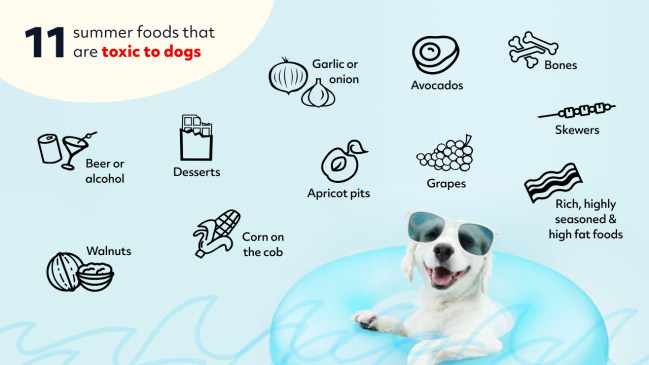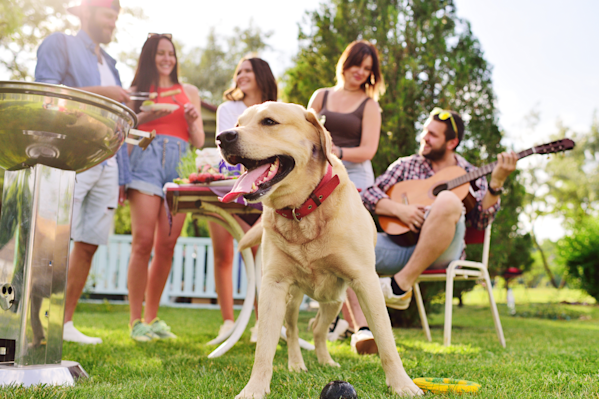Dogs love to eat the food their people are eating and they don’t always quite understand that what is acceptable for humans can be rather dangerous for them. For example, my shih tsu Lily is always at the table asking for tastes of what we’re eating. We’ll call out “Sorry Lily, onions!” and she looks at us in distrust and disgust.
It’s fair to think Lily has no idea what onions are and probably just assumes it’s an exotic way of saying no, but onions are high on the list of foods that are a no-go for pets this summer, or any time. Some others may be surprising though! With the help of vets and pet experts, we put together a list of the toxic foods your dog should avoid this summer.
Common summer foods that are toxic to dogs
1. Beer or alcohol
I love you, dog! What could be better than kicking back on a warm summer day with a cold brew in your hand and your best friend at your side? Just don’t let Bandit convince you to share. Beer and alcohol are toxic to dogs. “Dogs should be kept away from alcohol and it should never be offered as a treat,” says Dr. Ken Sieranski, Director of Veterinary Medicine at Hearts Alive Village Las Vegas.
Even just lapping up a bit of spilled beer can be bad for them. Beer also contains hops which are poisonous to dogs. “Some dog breeds are even more susceptible to hop poisoning than others leaving them extra vulnerable to a condition called Malignant Hyperthermia,” says Dr. Sieranski. When malignant hyperthermia occurs, the dog’s temperature can quickly rise 6-10 degrees above normal. The dog may suffer from abdominal pain, muscle spasms, seizures, and even death.
2. Apricot pits
Can a dog eat apricot pits? Spit them out! The flesh of an apricot is fine to share, but apricot pits, stems, and leaves contain a chemical compound called amygdalin. “Once eaten, it breaks down in the animal’s body and can lead to cyanide poisoning,” says Dr. Sieranski.
Make sure to safely dispose of the pits after you enjoy these tasty fruits. Dogs can be opportunistic and your trash should always be secured. “Many people grow apricot trees in their yard without a second thought,” says Dr. Sieranski. Make sure you get to the fallen fruit before your dog helps himself. “Some symptoms of cyanide toxicity include rapid breathing and excessive salivation as well as bright red gums,” says Dr. Sieranski.
3. Walnuts
What do you have in your mouth? Can dogs eat walnuts? The two most common types of walnuts are the black and the English walnut. It’s the black variety that is most concerning. “Walnuts have a higher water content and are also susceptible to mold,” says Dr. Sieranski. Moldy nuts contain tremorgenic mycotoxins produced by fungi and can be deadly to dogs when ingested, according to Dr. Sieranski. Symptoms can include vomiting, increased heart rate, seizures, weakness, and fever. If you suspect your dog ate black or moldy walnuts and are experiencing any of the symptoms, talk to a vet immediately.
4. Corn on the cob
Can dogs eat corn? While not toxic in the poisonous sense, corn on the cob can still be really dangerous for your dog in the summertime. Dogs may snaffle a whole cob off the barbecue or their owners’ plate and eat it whole. “The cob is indigestible and can easily become lodged in the small intestine,” says Dr. Linda Simon, a veterinary surgeon and also a veterinary consultant for FiveBarks. “This causes a dangerous obstruction and can lead to gut laceration and peritonitis,” says Dr. Simon. Surgery is needed to remove the offending item.

5. Skewers
Similarly, meat or veggies on skewers pose a real risk. Dogs are so attracted by the delicious aroma and taste of the food that many will swallow a wooden or metal skewer whole. “This is very dangerous and can pierce the food pipe or stomach,” says Dr. Simon, who warned that sometimes, the skewer can be removed via endoscopy before it has done too much damage.
6. Garlic or onion
Can dogs eat garlic or onion? No! Meat that has been seasoned with garlic or onion is a big no-no always. “Any members of the Allium family are toxic,” says Dr. Simon. They are hazardous if eaten in large quantities or over a period of time.
7. Avocados
Are avocados safe for dogs to eat? While sources seem to be mixed on this, avocados are generally a dangerous idea for dogs, but that doesn’t mean your dog will ever stop asking for it — and they are everywhere during the summer, between guacamole and burger fixings. Avocados contain persin, a fungicidal toxin, which is toxic and sometimes even deadly to dogs in high doses.
8. Grapes
Can dogs eat grapes? While a tasty fruit salad may seem like a great idea to cool off, be sure not to share any grapes with your beloved pooch. “Grapes are highly toxic and can cause acute kidney failure, even in very small doses,” says Dr. Simon.
9. Bones
Bones, whether raw or cooked, are generally not a good idea to offer your four-legged friends. “While some owners will throw their dog the remnants of their barbecued meat, this can cause constipation or even a blockage,” says Dr. Simon. If the bone splinters, it can be dangerous at every stage of digestion. To be safe, stay away from bones.
10. Desserts
While delicious desserts are a vacation staple, keep your dog away from anything containing chocolate, macadamia nuts, or the artificial sweetener Xylitol, warns Dr. Simon. These are all toxic ingredients that can make dogs very poor.
11. Rich foods
Very rich or highly seasoned food, as well as food high in fat, can make your dog unwell. “Dogs can develop pancreatitis (inflammation of the pancreas) or gastroenteritis if given foods such as a greasy burger or slice of bacon,” says Dr. Simon. While it is tempting to share tasty foods with your dog, stick to plain chicken meat and white fish.
